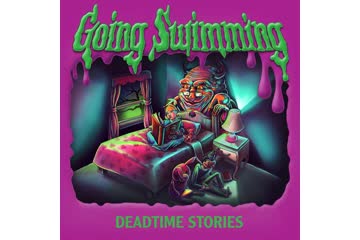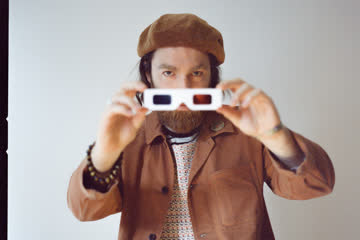Live Review: Aldous Harding, H. Hawkline
"Her presence was confrontational in the best sense of the word: she invited the audience to examine our own response to the music, and to consider the absurdity of searching for truth in art, or in someone else."

“This is my band,” Huw Evans, who performs as H. Hawkline, said, indicating to a reel-to-reel tape machine to his left. “That’s not a reel band,” one audience member quipped, quietly, as if acknowledging that the Welsh singer-songwriter had surely heard this one before. Nonetheless, it proved a somewhat prescient comment, as the blurred distinction between authenticity and artifice emerged as a recurrent theme this evening at the Princess Theatre.
Seated centre-stage, under the spotlight, Hawkline seemed at once both present and detached; while he engaged in some light crowd work before the set, dedicating it to the one other Welsh member of the audience, he was quick to add that this was simply a cheap ploy to make the performance seem more personal or sentimental. Later in the set, when he stood up from his chair and put down his guitar – dropping the ‘pretence’ of the guitar, as he put it – to sing Last Thing on Your Mind karaoke-style, he still maintained an air of listlessness.
His relationship to the music from the tape-player was similarly ambivalent: he strummed along to Means That Much while a guitar solo played in the background, though he played the solo himself during Suppression Street. These contradictions are of course a feature, not a bug, of Hawkline’s music, and they call to mind not only fellow Welsh musician Cate Le Bon’s abstractionist approach to evoking something beyond linguistic or interpersonal expression, but tonight’s main act, too.
Something of reversal happened when Aldous Harding and her band took to the stage: the four-piece backing band were made flesh, no longer a disembodied transmission from the past, although now the lead performer – ostensibly the focus of our attention – embodied a reflective surface, void of any attempt to indulge the audience’s expectations of coherent personhood. She wore her face like a kabuki mask, inscrutable and severe.
Harding paced the stage almost menacingly, drifting away from the microphone stand between lyrics to stare down the audience – as if we were the real show. However, rather than seeming hostile, her presence was confrontational in the best sense of the word: she invited the audience to examine our own response to the music, and to consider the absurdity of searching for truth in art, or in someone else.
This deflection of responsibility has the effect of creating wonderful opportunities for humour within Harding’s music, as she approaches both language and performance with wry, subversive delight. To listen to her perform songs from her latest record, Warm Chris, is to be startled anew by the unexpected twists and turns of these subtly-unruly compositions, from the unintelligible mumbling at the end of Ennui to the hilarious four-note guitar solo within Tick Tock and the feigned ending of Fever midway through.
Don't miss a beat with our FREE daily newsletter
Seeing Harding’s physical performance only emphasises the sense of play that lies at the heart of her music. She chose to seat herself for Leathery Whip, for instance, slouching back into the chair like it were a lounge, pulling herself almost underneath the microphone, as she voiced one of the oafish characters within the song. Furthermore, she made mischievous, impish use of various hand-held percussive instruments, including a tambourine (Fever and Lawn), a cabasa (Passion Babe) and a coffee mug that she beat insistently with a drumstick (Old Peel), dancing like a human marionette.
By the end of the evening, Harding had performed Warm Chris in full, interspersed with a few tracks from her two immediately-preceding albums, Party and Designer. The inclusion of Imagining My Man in the setlist was particularly notable, not only because it was the furthest back she reached into her catalogue – which she has largely left behind as she continues to explore new characters – but also for the way it presented itself as something of an ur-text for the way her recent music houses a polyphonic menagerie of voices that intrude within the songs in unpredictable moments.
Perhaps the most surprising choice Harding made was to finish the encore with She’ll Be Coming Round The Mountain, a slow, mournful song, ending the night on a note of upended expectations: “You made such a mountain, she won’t be coming round,” she sang, offering a twist on the traditional folk song, as well as a reminder to us all that we are at our best when we are free to roam.







